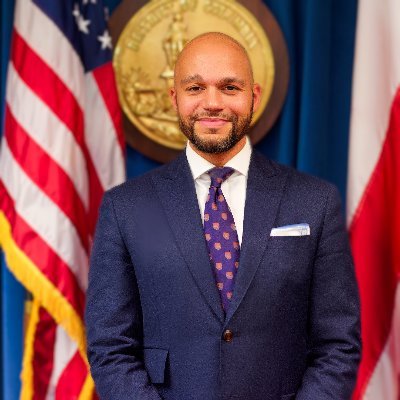Just as physical infrastructure investments are essential to our economic success, so too are investments in human infrastructure. Increasing access to high-quality childcare is critical to ensuring families are able to work and a critical component of childcare is a highly-skilled early education workforce that is supported and compensated accordingly. As the nation continues to work toward an equitable recovery, we must keep young children, families, and those who care for them top of mind.

NLC’s On Your Mind series features local leaders and early childhood champions across the country. In this edition, we asked Councilmember Robert White, of Washington, DC what’s on his mind about early childhood success and how Washington, DC is working to increase access to childcare while simultaneously addressing early educator compensation.
As a leader in local government, what is one thing keeping you up at night when you think about the young children, families, and early childhood educators in your community?
Educator retention. Many care-based professionals, including educators, have shared that they are beyond exhausted from the added burdens the pandemic placed on their already heavy plates. I worry that without adequate compensation and meaningful changes to work environments to better suit their needs and the needs of the children and youth they serve, we will continue to undervalue and lose key members of our workforce. This will impact the youth and families who not only rely on early childhood educators for care but who also develop relationships and trust with their teachers and caregivers.
With an unprecedented amount of federal investment in local government, how has your city been able to leverage those investments (from feds and from the state) to support the well-being of families, increase access to quality early learning opportunities for young children, or better support and prepare early childhood educators?
The very first major issue I took up when I was a brand-new councilmember with a brand-new baby was improving access to high-quality childcare for all families. In response to the needs raised by early childhood educators and families, including those from a coalition called Under 3 DC, I was proud to introduce the BEGIn Act, parts of which were included in the “Birth-to-Three for All DC Act of 2018.” That detailed legislation laid the groundwork to put DC on the path to universal childcare and holistically improve the early childhood education system, from improving access to programs that support infant and toddler development for low-income families to increasing pay for early childhood educators. Last year, DC Council set aside $53,920,878 in local funding, out of our $18.4 billion budget, to begin implementing the increase in pay through the Early Childhood Educator Pay Equity Fund. In February 2022, an Early Childhood Education Task Force, which was charged with determining how best to get this money out to our early educators, published a report with recommendations for distributing the $53.9 million in FY22 funding, as well as funding for future years.
Additionally, the District used federal relief dollars to support almost every provider in the District through grant funds to expand, open new, or improve existing child development facilities to enhance the supply and quality of childcare services in DC. The District provided financial assistance to support child development facilities in neighborhoods most impacted by COVID-19 by providing funds to under-enrolled facilities to ensure they could remain in operation. We also used American Rescue Plan Act (ARPA) funds to increase our Pre-K subsidy reimbursement rate and to increase funding for the Early Childhood Educator (ECE) Workforce College Development Program (WCDP), which supports current early childhood teachers in accruing needed skills and credentials.
What role does racial equity play in this work? How has the city prioritized uplifting Black, Indigenous, and People of Color (BIPOC communities)? What structures are in place for equity in recovery and policymaking?
Early childcare workers in DC are overwhelmingly women of color. Working to address the pay inequities seen in care-based professions like early childhood education has been a tangible way to ensure DC’s investments align with the goal of improving racial outcomes. We also know that access to high-quality childcare can be out of reach for many families of color, whether due to proximity to facilities, cost, or the need for care during non-traditional hours. In working toward universal childcare, we need to ensure that there are options that meet the diverse needs of District families, with particular consideration for families of color. In terms of ongoing structural checks on racial equity as we make policy, DC Council is fortunate to now have a Council Office on Racial Equity (CORE) that assesses legislation and determines whether the proposed law will advance racial equity, maintain the status quo of racial inequity, or will exacerbate racial inequity. Importantly, the most effective initiatives I have been a part of have come directly from impacted communities. The more we listen to and are in active partnership with those affected, the more successful the outcomes have been. DC has a long way to go to normalize racial equity work in practice, especially when it comes to checking back in to evaluate the impact our policies have had on Black, Indigenous, and other communities of color. With guidance from CORE and impacted residents, I am hopeful we will get there.









